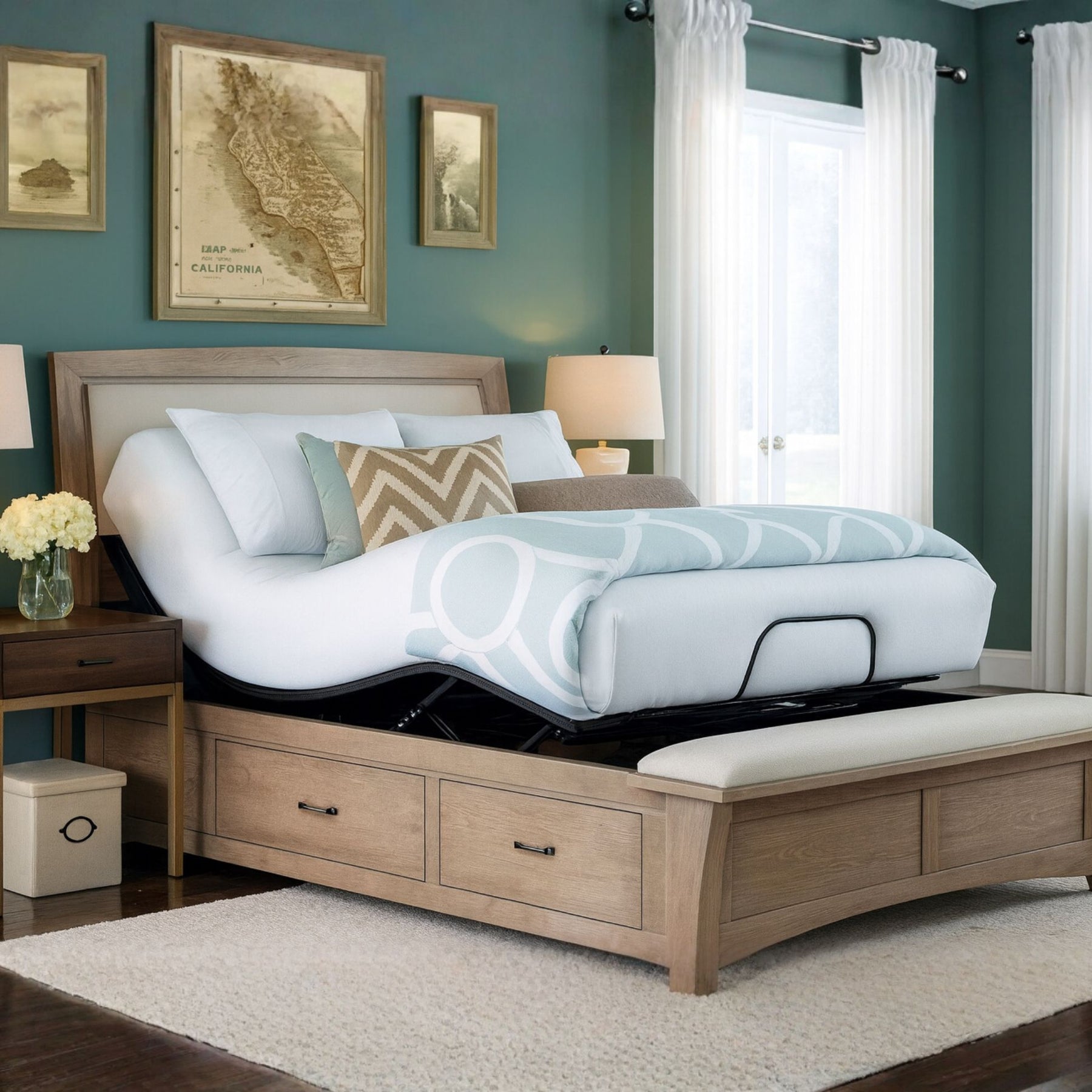Are you having a hard time sleeping and wonder if it's linked to your age? It might surprise you that our sleep needs evolve throughout different stages of life. In this informative blog post, we shed light on the intricate relationship between aging and sleep patterns, including how your slumber alters from childhood to adulthood.
Don't miss out—dive in now to learn why a healthy snooze isn’t just about quantity but quality too!
How Sleep Needs Change Throughout Different Life Stages
Sleep needs vary by age and are influenced by factors such as growth, development, physical activity level, and overall health.
Sleep needs vary by age
Babies rest for most of the day. Kids need up to 12 hours of sleep at night. As teens, we still need about nine hours a night. But once we hit our late teen years, eight hours seems to be enough.
As folks get older they often find it hard to fall asleep. Nighttime waking also happens more often as you age. Changes in your body clock can send you off to bed earlier and wake you up earlier too! So yes, sleep needs do vary with age!
Factors that contribute to changes in sleep as we age
Aging affects sleep in many ways. As people grow old, they often face sleep disturbances. These include trouble falling asleep and staying asleep. This is because their biological clock changes with age. It makes them wake up early or sleep late.
Chronic conditions also affect sleep as one ages. Some common ones are insomnia, restless legs syndrome, and sleep apnea. They make it hard for a person to have a peaceful night's rest. Cognitive decline due to aging can cause poor sleep too. It may lead to confusion at bedtime or during the night.
Another big factor is hormonal changes in the body due to the aging process which can lower melatonin production, a hormone that helps us sleep.
Age-Related Changes in Sleep
As we age, there are significant changes in our sleep patterns and behaviors.
Sleep duration
Sleep duration gets shorter as we get older. People from 18 to 64 need seven or more hours of sleep each night. For people who are 65 and older, their sleep needs might be different. Not getting enough sleep can harm the aging process and lead to health problems tied to age.
To stay healthy and slow down aging, we must aim for a good quantity of quality sleep every single day regardless of our age.
Sleep initiation
As we age, it can become more difficult to fall asleep. This is because our bodies go through changes that affect our sleep patterns. For example, older adults may have trouble initiating sleep and find it harder to relax and drift off.
They may also experience bouts of insomnia or have restless sleep. These changes in sleep initiation can be frustrating and may lead to daytime sleepiness or fatigue. Lack of quality sleep can also contribute to the aging process itself, so it's important to address any difficulties with falling asleep as we get older.
Sleep efficiency
Sleep efficiency refers to how well you sleep during the night. As we age, our sleep efficiency tends to decrease. This means that older adults may have more trouble falling asleep and staying asleep throughout the night. Poor sleep quality in older adults can be due to lifestyle changes, such as medications, health conditions, or changes in daily routines. Age-related changes in sleep structure and stages also play a role in sleep efficiency.
Physiological changes, like decreased production of certain hormones, along with changes in sleep-related habits and the presence of sleep disorders can contribute to lower sleep efficiency with age.
Sleep maintenance
As we age, our ability to maintain sleep throughout the night can be affected. This means that older adults may have a harder time staying asleep and often wake up during the night. Poor sleep maintenance in older adults can lead to fragmented sleep and frequent disruptions, which can leave them feeling tired and exhausted during the day. Age-related changes in sleep patterns, such as decreased deep sleep and increased light sleep, contribute to these difficulties in maintaining a restful night's sleep.
Addressing these changes through proper support from a quality mattress can help promote better sleep maintenance for older adults, and also avoid mattress body impressions.
Age-Related Changes in Circadian Rhythms
As we age, our circadian rhythms, which regulate our sleep-wake cycles, undergo significant changes. This can result in shifts in sleep patterns, reduced ability to adjust to changing schedules, and changes in sleep homeostasis.
To learn more about how aging impacts our circadian rhythms and overall sleep quality, continue reading.
Shifts in sleep patterns
As we age, our sleep patterns tend to change. One common shift is that sleep tends to occur earlier in the evening and wake-up times become earlier too. This means that older adults may find themselves feeling more tired and ready for bed earlier than they did when they were younger.
Along with this, older adults often experience increased daytime sleepiness and may take more frequent naps during the day. These changes are influenced by alterations in our internal body clocks, known as circadian rhythms, which regulate our sleep-wake cycles. It's important for mattress buyers to consider these shifts in sleep patterns when choosing a new mattress to ensure their comfort and support throughout the night.
Reduced ability to adjust to changing schedules
As we age, our ability to adjust to changing schedules tends to decrease. This is because of changes in our circadian rhythms, which are like internal body clocks that regulate when we feel awake and when we feel sleepy.
These rhythms can become more rigid as we get older, making it harder for us to adapt to different sleep and wake times. This reduced flexibility can lead to difficulties falling asleep or staying asleep when our schedule changes, causing sleep disturbances and deprivation.
It's important for older adults to prioritize a consistent sleep schedule and create a comfortable sleep environment in order to promote healthy sleep at any age.
Changes in sleep homeostasis
As we age, there are changes in our sleep homeostasis, which can affect the quality of our sleep. Sleep homeostasis refers to the balance between how much sleep you need and how long you stay awake.
In older adults, this balance can become disrupted, leading to difficulties in falling asleep and staying asleep throughout the night. These changes in sleep homeostasis can also result in shorter periods of deep sleep and more frequent awakenings during the night.
It's important to understand these changes so that we can find ways to promote healthy sleep as we get older. One factor that contributes to changes in sleep homeostasis is a decrease in our body's ability to produce certain hormones related to sleep as we age. Hormones like melatonin, which help regulate our internal clock and signal when it's time for us to fall asleep, may be reduced in older adults. This can make it harder for them to feel sleepy at bedtime and cause their bodies' natural rhythms to become less consistent.
Additionally, aging can also lead to shifts in our circadian rhythms, the internal processes that control when we feel alert or tired throughout the day. Older adults may experience an earlier shift towards feeling sleepy earlier in the evening and waking up earlier in the morning than they did when they were younger.
This change can disrupt their regular sleep patterns and make it difficult for them to adjust their schedules if needed.
Sleep-Related Hormones, Aging, and Sleep
Aging can have an impact on hormones related to sleep, leading to changes in sleep patterns and quality of sleep.
Impact of aging on hormones related to sleep
As we age, our hormones related to sleep can be impacted. Hormones like melatonin and cortisol, which play a role in regulating our sleep-wake cycle, may change as we get older. These changes can disrupt our sleep patterns and make it more difficult to fall asleep or stay asleep throughout the night.
Additionally, hormonal fluctuations during menopause can also contribute to sleep disturbances in women. It's important for mattress buyers of all ages to be aware of these hormonal changes and consider how they might affect their sleep quality.
Changes in sleep-related hormones
As we age, there are changes in the production of hormones that can affect our sleep. Hormones like melatonin and cortisol play a role in regulating our sleep-wake cycle. However, these hormone levels may become imbalanced as we get older, leading to disrupted sleep patterns.
This disruption can negatively impact hormonal rhythms and metabolism, increasing the risk of obesity, insulin resistance, diabetes, and other hormonal disorders. Additionally, deterioration of sleep due to aging can lead to a decrease in deep sleep, which is important for growth hormone secretion.
Female hormonal transitions during different phases of the menstrual cycle can also contribute to changes in sleep architecture and an increased risk for sleep disorders. So it's important to understand how these changes in sleep-related hormones can affect our overall health and well-being as we age.
Risk Factors for Sleep Disturbances in Older Adults
Medical comorbidities and psychiatric illness, primary sleep disorders, and social, lifestyle, and environmental factors contribute to sleep disturbances in older adults.
Medical comorbidities and psychiatric illness
Medical comorbidities and psychiatric illness can significantly impact sleep quality in older adults. Factors such as chronic medical conditions and psychological disorders can contribute to sleep disturbances and interfere with getting a restful night's sleep. Here are some common risk factors for sleep disturbances in older adults:
- Medical conditions: Older adults are more likely to have underlying medical conditions, such as heart disease, diabetes, respiratory disorders, and chronic pain, which can disrupt their sleep.
- Psychiatric disorders: Conditions like depression, anxiety, and dementia are prevalent among the elderly population and can cause insomnia symptoms and other sleep disorders.
- Bidirectional relationship: There is a complex relationship between sleep disturbances and medical or psychological disorders in older adults. Sleep problems can exacerbate existing health conditions, while these conditions can also worsen sleep quality.
- Female gender: Research suggests that women may be at higher risk of experiencing sleep disruptions due to hormonal changes during menopause.
- Dementia: Individuals with dementia often experience fragmented sleep patterns and may have difficulty falling asleep or staying asleep throughout the night.
- Depression: Depression is commonly associated with sleep disturbances, including insomnia or excessive daytime sleepiness.
- Other factors: Chronic pain disorders, atrial fibrillation (irregular heartbeat), and certain medications may also contribute to nighttime awakenings or disrupted sleep in older adults.
Primary sleep disorders
Primary sleep disorders are common in older adults and can have a significant impact on their sleep quality. Some of the most common primary sleep disorders experienced by older adults include insomnia, restless legs syndrome, narcolepsy, and sleep apnea. These disorders can cause various sleep disturbances such as delayed sleep onset, multiple arousals during sleep, and difficulty maintaining a restful sleep. It is important for older adults to be aware of these disorders and seek appropriate treatment if necessary.
Social, lifestyle, and environmental factors
Poor sleep quality in older adults can be influenced by several social, lifestyle, and environmental factors. Here are some important factors to consider:
- Living arrangements: Older adults who live alone may experience increased feelings of loneliness and isolation, which can negatively impact their sleep quality.
- Stress and anxiety: Life changes such as retirement, the loss of a loved one, or health issues can contribute to elevated stress levels and anxiety, which can disrupt sleep patterns.
- Noise and light exposure: Increased sensitivity to noise and light can make it more difficult for older adults to fall asleep and stay asleep. Creating a quiet and dark sleep environment is essential.
- Medications: Certain medications commonly used by older adults, such as those for pain management or heart conditions, may have side effects that interfere with sleep.
- Physical activity: Maintaining regular physical activity during the day can promote better sleep at night. However, excessive exercise close to bedtime may have the opposite effect.
- Diet and caffeine intake: Consuming heavy meals or foods high in sugar or caffeine close to bedtime may make it harder to fall asleep. It's important to establish healthier eating habits for better sleep quality.
- Alcohol consumption: While alcohol may initially help with falling asleep, it can disrupt the later stages of sleep and lead to fragmented and poor-quality sleep overall.
Tips for Healthy Sleep at Any Age
Establish a consistent sleep schedule, create a comfortable sleep environment, and practice good sleep hygiene to improve the quality of your sleep at any age.
Establish a consistent sleep schedule
Having a regular sleep schedule is important for getting good sleep and maintaining overall health. Here are some tips to establish a consistent sleep schedule:
- Go to bed and wake up at the same time every day, even on weekends.
- Avoid staying up late or sleeping in too much, as it can disrupt your body's internal clock.
- Create a relaxing bedtime routine to signal to your body that it's time to sleep.
- Limit exposure to bright lights, including electronic devices, before bed as they can interfere with your natural sleep-wake cycle.
- Avoid napping during the day, especially if you're trying to fix a disrupted sleep schedule.
- If you're having trouble falling asleep or waking up at a consistent time, try adjusting your bedtime gradually by 15-minute increments each night until you reach your desired schedule.
Create a comfortable sleep environment
A comfortable sleep environment is important for maintaining healthy sleep at any age. Here are some tips to create an optimal sleep space:
- Make sure the bedroom is dark: Dim the lights or use blackout curtains to block out external light that can interfere with sleep.
- Keep it quiet: Reduce noise interference by using earplugs or a white noise machine to drown out sounds that may disrupt your sleep.
- Use a comfortable mattress: Choose a mattress that provides adequate support and comfort for your body to help you relax and fall asleep faster.
- Control the temperature: Keep the bedroom cool and well-ventilated to promote better sleep.
- Eliminate distractions: Remove electronic devices or anything that might distract you from sleeping, such as TVs, computers, or smartphones.
- Create a peaceful ambiance: Use calming scents, such as lavender, in the bedroom to promote relaxation and induce sleep.
- Optimize your bedding: Invest in high-quality pillows and bedding that suit your preferences and ensure maximum comfort during sleep.
Practice good sleep hygiene
- Stick to a consistent sleep schedule by going to bed and waking up at the same time every day.
- Create a comfortable sleep environment by keeping your bedroom dark, quiet, and cool.
- Establish a relaxing bedtime routine that helps you unwind and signals to your body that it's time to sleep.
- Limit exposure to electronic devices, such as smartphones and tablets, before bed as the blue light can interfere with sleep.
- Avoid consuming caffeine, nicotine, and alcohol close to bedtime as they can disrupt your ability to fall asleep and stay asleep.
- Engage in regular exercise during the day, but avoid vigorous workouts close to bedtime as it can make it harder for you to relax.
- Avoid eating heavy meals or drinking large amounts of fluids before bed as it can lead to discomfort and frequent trips to the bathroom.
- If you're struggling with persistent sleep problems, consider seeking help from a healthcare professional who specializes in sleep disorders.
Remember, practicing good sleep hygiene is essential for promoting healthy sleep habits regardless of age. By following these tips, you can improve your sleep quality and wake up feeling refreshed and energized each day.
Conclusion
In conclusion, sleep needs change as we age. Factors like circadian rhythms and hormonal changes affect our sleep patterns. It's important to establish healthy sleep habits at any age to ensure good quality sleep.
By understanding how sleep changes throughout different life stages, we can prioritize restful nights and overall well-being.
FAQs
1. How much sleep do adults need?
Adults typically need 7-9 hours of sleep per night to function at their best.
2. Do older adults need less sleep?
Yes, as we age, our sleep needs tend to decrease. Older adults may find that 7-8 hours of sleep is sufficient for them.
3. How much sleep do teenagers need?
Teenagers require about 8-10 hours of sleep per night to support their growth and development.
4. How many hours of sleep do infants and young children need?
Infants (0-12 months) generally need around 14-17 hours of total sleep each day, while toddlers (1-2 years) require about 11-14 hours.
5. Can lack of sufficient sleep affect our health at different life stages?
Yes, inadequate or poor quality sleep can have negative effects on physical and mental health regardless of age, leading to issues like fatigue, impaired cognitive function, mood disturbances, and an increased risk for chronic conditions.



















